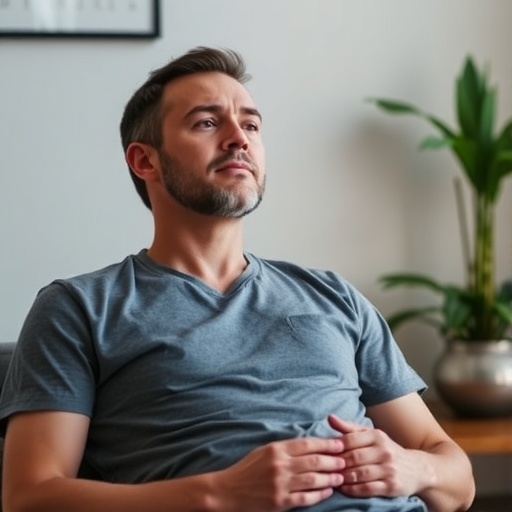In a groundbreaking pilot study recently published in JAMA Oncology, researchers have brought attention to acupuncture as an effective and safer alternative treatment for nocturia in prostate cancer survivors. Nocturia, defined as waking up one or more times during the night to urinate, is a widespread and debilitating symptom that significantly impairs quality of life. More than half of prostate cancer survivors suffer from this condition, which often persists despite conventional management strategies. The trial’s results suggest that acupuncture not only reduces the frequency of nocturnal urination but does so with fewer adverse effects than commonly used pharmacological interventions.
Mechanistically, acupuncture is hypothesized to influence the nervous system and modulate autonomic functions that govern urinary bladder control. By stimulating specific acupoints, practitioners aim to recalibrate feedback loops between the bladder, spinal cord, and brain, reducing the urgency and frequency of nocturnal voiding. This neurophysiological modulation can potentially restore circadian regulation of urine production and bladder sensation, addressing the multifaceted pathology underlying nocturia, especially in patients with a history of prostate cancer.
.adsslot_MOhW0xn6bE{ width:728px !important; height:90px !important; }
@media (max-width:1199px) { .adsslot_MOhW0xn6bE{ width:468px !important; height:60px !important; } }
@media (max-width:767px) { .adsslot_MOhW0xn6bE{ width:320px !important; height:50px !important; } }
ADVERTISEMENT
The pilot nature of this trial speaks to both the promise and the necessity for expanded research into acupuncture as a urological intervention. While preliminary, the data underscore a critical advantage: the reduction of adverse events. Patients receiving acupuncture reported fewer side effects compared to those on traditional drug therapies. This safety profile is crucial in a population often managing multiple comorbidities and polypharmacy following prostate cancer treatment.
Furthermore, the trial’s patient population—prostate cancer survivors—is particularly important because they frequently experience nocturia secondary to cancer itself or its treatment modalities, such as surgery, radiation, or androgen deprivation therapy. These therapies can disrupt urinary tract integrity and function, leading to persistent lower urinary tract symptoms. Thus, a non-pharmacologic treatment modality that reduces nocturia could improve long-term survivorship care and patient well-being.
Beyond nocturia frequency, acupuncture might also positively affect sleep quality and overall physical function, both heavily impacted by interrupted sleep patterns. Quality of life metrics, although not the primary endpoint, are critical in understanding the full benefits of acupuncture intervention. Future clinical trials should incorporate comprehensive patient-reported outcomes to evaluate holistic impacts.
The research team, led by Dr. Kevin T. Liou, emphasized the methodological rigor employed in the study’s design, including randomized assignment and carefully monitored treatment protocols. Though the sample size was limited, the trial adhered to standardized acupuncture techniques and utilized validated nocturia assessment tools. These methodological strengths bolster confidence in the findings and provide a template for larger, multisite trials.
Interestingly, the implications of this trial extend beyond prostate cancer survivorship. Nocturia is a symptom prevalent in diverse populations, including older adults and those with other chronic conditions such as diabetes and heart failure. Demonstrating acupuncture’s efficacy in a complex post-cancer cohort may pave the way for broader application and acceptance of integrative approaches in urology and geriatric medicine.
The study also highlights a broader trend towards personalized medicine, where treatment plans are tailored not only to the disease but to patient priorities, including minimizing side effects and improving life quality. This aligns with patient-centric care models that increasingly incorporate complementary therapies supported by empirical research.
Despite the promising results, researchers acknowledge the necessity of larger randomized controlled trials to conclusively determine efficacy and understand the underlying biological mechanisms. Explorations into biomarkers of autonomic function, neuroimaging studies, and longitudinal follow-ups are needed to dissect how acupuncture delivers therapeutic benefits at molecular and systemic levels.
As the global population ages and cancer survivorship increases, addressing chronic symptoms with innovative approaches like acupuncture becomes paramount. This study heralds a new frontier in symptom management—one that bridges traditional healing practices with modern oncologic care to restore patient dignity and quality of life.
—
Subject of Research: The efficacy and safety of acupuncture in reducing nocturia severity in prostate cancer survivors.
Article Title: Not provided in the source content.
News Publication Date: Not specified.
Web References: Not provided.
References: (doi:10.1001/jamaoncol.2025.1199)
Image Credits: Not provided.
Keywords: Prostate cancer, Acupuncture, Medications, Medical treatments, Urine, Adverse effects
Tags: acupuncture benefits for urinary healthacupuncture for nocturia treatmentalternative therapies for nocturiaautonomic nervous system and bladder controlintegrative medicine for cancer recoveryJAMA Oncology study findingsmanagement of nocturia in prostate cancernon-invasive treatments for nocturiapharmacological alternatives for nocturiaprostate cancer survivor symptomsquality of life in cancer survivorsside effects of nocturia medications





